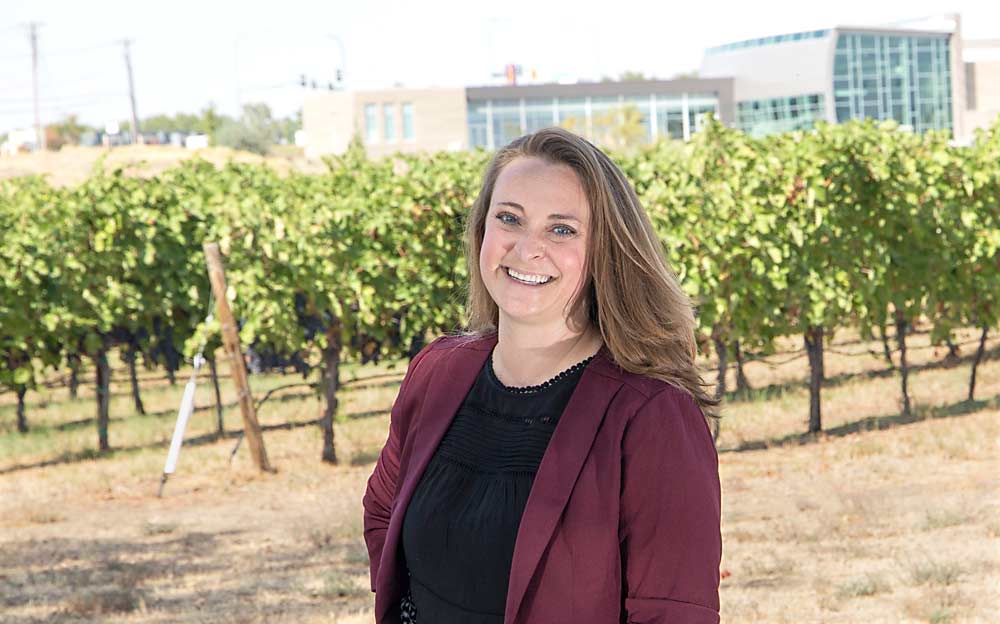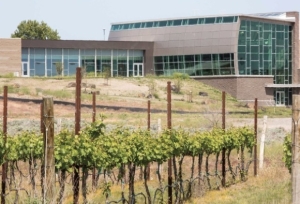
Washington State University wants to elevate its education offerings for viticulture and enology.
That effort started this year, with the decision to create a new department and degree program and the hiring of a new department chair who has experience in curriculum and department building.
Jean Dodson Peterson joined WSU Tri-Cities in September, after spending eight years at California Polytechnic State University, where she helped to build a new department and curriculum.
“I just fell in love with that process,” she said. “So, when this opportunity came up, it felt like the right time, the right place and the right opportunity to do all the things I enjoy.”
Dodson Peterson will be based at the Ste. Michelle Wine Estates WSU Wine Science Center in Richland, which opened in 2015 to provide state-of-the-art wine research and education facilities for students.
“The faculty team here is world-class, the research is cutting-edge, and the support and partnership from the industry is really special,” she said.
But despite the standout facilities, the Wine Science Center can feel a little quiet. Under the current V&E program, students and faculty are spread out in different departments and on different campuses. The new department will eventually bring all students together, giving them more of a sense of community with their peers and more connection to faculty.
“It’s not just the learning in the classroom that forms that four-year degree, it’s the conversations in the hallway,” she said. “The Wine Science Center is the perfect place to do this. When they built this, they created spaces meant to gather to discuss ideas and learn together.”
That’s been WSU’s vision for a long time, said Scot Hulbert, associate dean for research at WSU’s College of Agricultural, Human and Natural Resource Sciences. The wheels are in motion now, but it’s going to take time to build a department and curriculum.
“The department isn’t finished. We need to build it with more faculty with key expertise, once we figure out what we still need for teaching and research and extension,” he said. “It’s not going to start tomorrow.”
Bringing Dodson Peterson on board is an exciting step, he said, since she brings strong curriculum development experience and enthusiasm for undergraduate education. Her research background — in rootstock-scion interactions in grapevines — will also be an asset to WSU and Washington’s wine industry.
Dodson Peterson said she plans to work with her new colleagues over the next year or so to outline a clear vision for the department’s curriculum and to work with the industry to learn what it needs from the next generation.
“I want to make sure our partners in the industry understand that we want to build this vision with them,” she said.
The vision of partnership to strengthen V&E education is just what WSU needs, said Dick Boushey, a wine grape grower and member of the hiring committee that selected Dodson Peterson for the role. Boushey also leads the Washington State Wine Commission’s research committee.
“You have to put students first,” Boushey said in a statement. “Research is important, but you have to be a place where students want to come. Jean has the skills to do that. I’m as excited about this hire as anything the WSU wine program has done, and I’ve been working with this program since the 1980s.”
Having a department, not just a degree program, should also help to attract students who may not know about the career potential in the vineyard and wine industries. Dodson Peterson earned her undergraduate degree in viticulture and enology at the University of California, Davis, after she discovered the career path during an undergraduate introduction to wine class. She went on to earn her doctorate there in horticulture and agronomy under geneticist Andy Walker.
Now, she wants to help more students discover the opportunities in V&E.
“Part of the vision to have a department is to serve more students than we have in the past,” she said.
She’s counting on industry support for that, too.
“Washington state is really poised to be one of the long-term leaders in the industry,” Dodson Peterson said. “The community that exists here to support viticulture and enology is really unique…. This is a fantastic opportunity to reimagine student learning as it impacts Washington’s future.”
Bringing the educational program closer to the hub of the state’s wine industry and the university’s research farms and facilities in Prosser, rather than at WSU’s main campus in Pullman, much farther east, just makes sense, Hulbert said.
“Students will be more job-ready for the industry and for the next generation of research and extension. They’ll have more experience working with vines, more experience with winemaking, more opportunities for internships,” Hulbert said. “We can’t do that in Pullman.”
—by Kate Prengaman







Leave A Comment